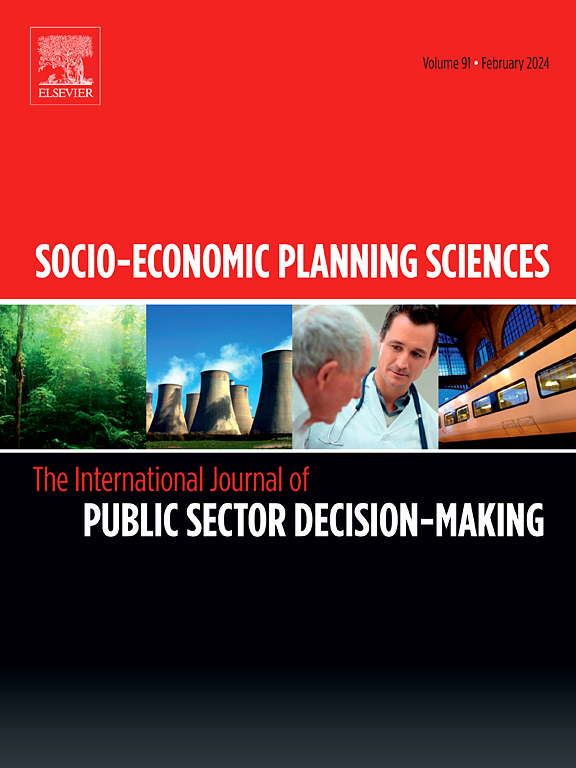Fleet sizing and dynamic relocation problems for electric kick scooter sharing system
IF 5.4
2区 经济学
Q1 ECONOMICS
引用次数: 0
Abstract
Electric kick-scooters (EKSs) have emerged as a promising solution to address first- and last-mile challenges in urban transportation. This paper presents an operational design framework that sequentially addresses fleet sizing and dynamic relocation problems to optimize operational performance. The fleet sizing problem aims to determine the minimal EKS fleet size and initial distribution required to achieve a predefined service level without considering battery charging or EKS relocations. The results indicate that fleet size increases with higher battery consumption per rental and elevated service level requirements. Three dynamic relocation strategies—truck-only, crowdsourcing-only, and hybrid—are modeled using a time-space network formulation to enhance system efficiency. Numerical analyses demonstrate that each relocation strategy significantly improves service levels compared to a non-relocation baseline. However, the maximum achievable service level is constrained by the initial fleet size and available relocation resources, and deploying extensive relocation resources for a smaller fleet cannot match the service rate improvements achievable through a larger EKS fleet. The results provide practical guidance for shared EKS operators, showing that hybrid relocation strategies can improve service performance under operational constraints. Among the three strategies, hybrid relocation consistently outperforms truck-only and crowd-only approaches when moderate relocation capacity is available.
电动踏板车共享系统的车队规模和动态迁移问题
电动滑板车(EKSs)已经成为解决城市交通第一英里和最后一英里挑战的有希望的解决方案。本文提出了一个操作设计框架,该框架依次解决了车队规模和动态搬迁问题,以优化操作性能。车队规模问题的目的是在不考虑电池充电或EKS重新安置的情况下,确定达到预定义服务水平所需的最小EKS车队规模和初始分布。结果表明,车队规模随着每次租赁电池消耗的增加和服务水平要求的提高而增加。为了提高系统效率,采用时空网络模型建立了三种动态搬迁策略——卡车搬迁策略、众包搬迁策略和混合搬迁策略。数值分析表明,与非迁移基线相比,每种迁移策略都显著提高了服务水平。然而,可达到的最大服务水平受到初始机队规模和可用的搬迁资源的限制,为较小的机队部署大量的搬迁资源无法与较大的EKS机队所实现的服务率提高相匹配。研究结果为共享EKS运营商提供了实践指导,表明混合搬迁策略可以提高运营约束下的服务绩效。在三种策略中,当有适当的搬迁能力时,混合搬迁策略始终优于仅卡车和仅人群的搬迁策略。
本文章由计算机程序翻译,如有差异,请以英文原文为准。
求助全文
约1分钟内获得全文
求助全文
来源期刊

Socio-economic Planning Sciences
OPERATIONS RESEARCH & MANAGEMENT SCIENCE-
CiteScore
9.40
自引率
13.10%
发文量
294
审稿时长
58 days
期刊介绍:
Studies directed toward the more effective utilization of existing resources, e.g. mathematical programming models of health care delivery systems with relevance to more effective program design; systems analysis of fire outbreaks and its relevance to the location of fire stations; statistical analysis of the efficiency of a developing country economy or industry.
Studies relating to the interaction of various segments of society and technology, e.g. the effects of government health policies on the utilization and design of hospital facilities; the relationship between housing density and the demands on public transportation or other service facilities: patterns and implications of urban development and air or water pollution.
Studies devoted to the anticipations of and response to future needs for social, health and other human services, e.g. the relationship between industrial growth and the development of educational resources in affected areas; investigation of future demands for material and child health resources in a developing country; design of effective recycling in an urban setting.
 求助内容:
求助内容: 应助结果提醒方式:
应助结果提醒方式:


